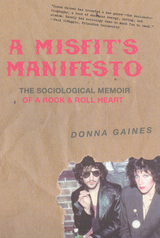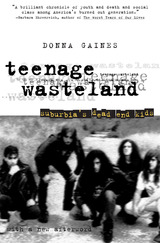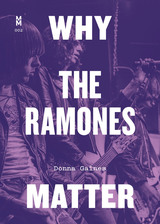
Dubbed the Margaret Mead of heavy metal, Donna Gaines is a walking, talking oxymoron, a turnpike intellectual. A Misfit's Manifesto is the story of her wild-in-the-burbs odyssey-from overweight yeshiva girl to savvy street-punk sociologist. Isolated, angry, and depressed through most of her adolescence and early adulthood, she found truth and beauty in the least likely places. Wandering the craggy terrain of Rockaway Beach, Queens, Gaines embarked upon a path to enlightenment involving sex, drugs, rock & roll, sociology, cosmetology, True Love, the occult, tattoos, science fiction, pizza, guns, comic books, and surfing-by Web and by sea.
For Gaines, dignity, joy, and communion came not from family, organized religion, or mandatory schooling, but in the sound of doo-wop, surf music, acid rock, then punk, trash metal, and hardcore. "For most of my life," she writes, "music was the only way to connect that wouldn't eventually kill me."
Through all the ripped nights of binge-drinking, pill-popping, and nightclubbing, Gaines became an acclaimed author, scholar, and expert on teen suicide. In an age of conformity and censorship, she defends popular culture as a powerful spiritual force-a vibrant, valid connection to God. A meditation on alienation and engagement, this memoir is an outcast's journey into the black-hole sun, where Divine love and light are found-even in Ramones songs.
This edition includes a scholarly introduction that considers memoir as a sociological as well as literary genre, as a reflexive means of understanding the self in social context while nurturing a sociological imagination. Social memoir, Gaines argues, illuminates problems like alienation, marginality, addiction, and suicide, while making sociology more user-friendly and public. Now this work of dazzling originality and iconoclasm that has inspired misfits everywhere is an ideal text for classroom use, making complex social theory exciting, timely, and relevant for students.

"A powerful book."—Samuel G. Freedman, New York Times Book Review
"[Gaines] sheds light on a poorly understood world and raises compelling questions about what society might do to help this alienated group of young people."—Ann Grimes, Washington Post Book World
"There is no comparable study of teenage suburban culture . . . and very few ethnographic inquiries written with anything like Gaines's native gusto or her luminous eye for detail."—Andrew Ross, Transition
"An outstanding case study. . . . Gaines shows how teens engage in cultural production and how such social agency is affected by economic transformations and institutional interventions."—Richard Lachman, Contemporary Sociology
"The best book on contemporary youth culture."—Rolling Stone

The central experience of the Ramones and their music is of being an outsider, an outcast, a person who’s somehow defective, and the revolt against shame and self-loathing. The fans, argues Donna Gaines, got it right away, from their own experience of alienation at home, at school, on the streets, and from themselves. This sense of estrangement and marginality permeates everything the Ramones still offer us as artists, and as people. Why the Ramones Matter compellingly makes the case that the Ramones gave us everything; they saved rock and roll, modeled DIY ethics, and addressed our deepest collective traumas, from the personal to the historical.
READERS
Browse our collection.
PUBLISHERS
See BiblioVault's publisher services.
STUDENT SERVICES
Files for college accessibility offices.
UChicago Accessibility Resources
home | accessibility | search | about | contact us
BiblioVault ® 2001 - 2024
The University of Chicago Press









